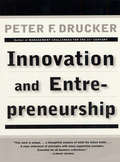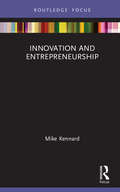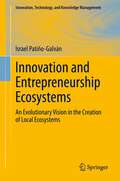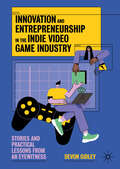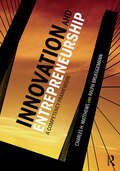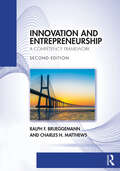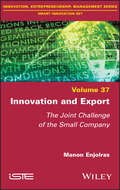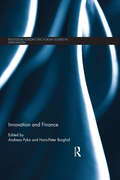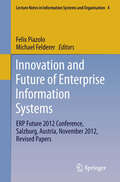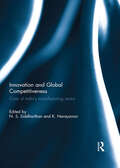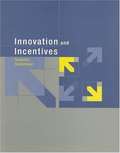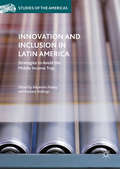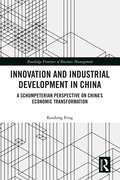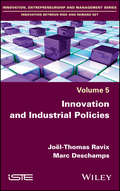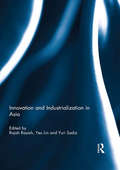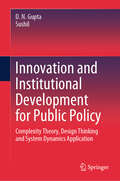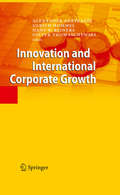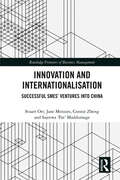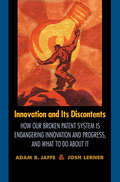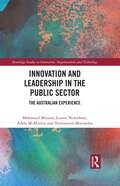- Table View
- List View
Innovation and Entrepreneurship
by Peter F. DruckerPeter Drucker's classic book on innovation and entrepreneurship This is the first book to present innovation and entrepreneurship as a purposeful and systematic discipline that explains and analyzes the challenges and opportunities of America's new entrepreneurial economy. Superbly practical, Innovation and Entrepreneurship explains what established businesses, public service institutions, and new ventures need to know and do to succeed in today's economy.
Innovation and Entrepreneurship (Management Practice Essentials)
by Mike KennardThe effective management of innovation and entrepreneurship is vitally important for managers, organisations and governments. This concise textbook examines strategic approaches and concepts relevant for the effective management of innovation and entrepreneurship, supported by practical insights from a variety of industry sectors. The book: • Identifies the key challenges and dilemmas faced by managers and executives charged with leading, stimulating and sustaining innovation within large complex organisations. • Explores the critical factors that drive entrepreneurial venture creation and growth, including the search for opportunities, the management of risk and the evaluation of alternative funding sources. • Considers how innovation and entrepreneurship can be facilitated through the development of technology, knowledge, intellectual property and networks. Each chapter includes an essential summary of the key points, a practical example focusing on innovation and entrepreneurship in action, discussion and reflection activities, as well as further reading suggestions. Innovation and Entrepreneurship provides a practical and concise introduction for executive education students studying MSc and MBA apprenticeship programmes, as well as supplementary reading for postgraduate students studying modules on Innovation and Entrepreneurship.
Innovation and Entrepreneurship Ecosystems: An Evolutionary Vision in the Creation of Local Ecosystems (Innovation, Technology, and Knowledge Management)
by Israel Patiño-GalvánThis book offers an alternative framework for the creation and evolution of local innovation and entrepreneurship ecosystems in which the central and operational role is led by the university through an Entity that Operates the Ecosystem (EOE). It explains how the university, industry and government actors interact to create ecosystems and how said ecosystems promote the growth and development of local start-ups. It provides researchers, scholars, academics and practitioners with a guide to the construction of innovation and entrepreneurship ecosystems and offers tools to assist in the creation of enterprises from entrepreneurial ideas.
Innovation and Entrepreneurship Education in China: Responding to Social Change (Education in the Asia-Pacific Region: Issues, Concerns and Prospects #60)
by Xiaozhou XuThis book explains the strategic appeal of innovation and entrepreneurship education based on the systematic analysis of the key characteristics and constraints of China’s economic transformation and upgrading. The book presents results related to studying the common trends of innovation and entrepreneurship education at the times of economic globalization and the experience of major countries, exploring the cultivation model of key innovation and entrepreneurship talents and mechanism of the innovation and entrepreneurship education ecosystem. Based on ecology and system theory, this book puts forward the concept of “global ecology” to explain the complex relationship among various elements in the process of innovation and entrepreneurship education.
Innovation and Entrepreneurship in an Educational Ecosystem: Cases from Taiwan
by Carol Yeh-Yun Lin Sehwa WuThis book reports on 12 education innovation cases in Taiwan and focus particularly on an ecosystem to demonstrate innovation as a competitive advantage and requires an ecosystem to be sustainable in virtually all disciplines. It also covers the trend of education innovation in many countries, with “education entrepreneurship” being the frequently used description. The 12 educators highlighted here are even more entrepreneurial than many businesspeople. Generally, schools are required to follow certain rules, especially the public schools. Accordingly, the book also describes how these education entrepreneurs have innovatively created a fostering environment under challenging constraints to facilitate the success of students, teachers, and even the local community. Six of the cases involve school-based innovation, while the other six focus on student-based innovation. Their stories provide valuable insights for all companies seeking to become more innovative in a resource-constrained setting.
Innovation and Entrepreneurship in the Indie Video Game Industry: Stories and Practical Lessons from an Eyewitness
by Devon GidleyThe indie video game industry attracts an enormous amount of enthusiasm and curiosity, blending cutting edge tech, a creative industries environment and a certain rebellious energy. It is idealised as a world where creative and technical ability is given free reign and can yield enormous financial and reputational rewards. But what is it really like to enter and work in this space? And how do the universal aspects of organisation, including teamwork, leadership and competition, manifest in this unique environment? By embedding himself in just such a hub, the author was able to explore the experiences and interactions of ten indie game companies, four mentors, various funders, and two interns over a one-year period. The narrative is structured around six critical events: the introduction of newcomers, change in organizational rules, departure of a dominant social actor, self-inflicted crisis, introduction of a powerful manager, and external crisis. A process view shows how these events can hinder or accelerate creative production. Going beyond success stories or failure statistics, this book analyses the organizational and entrepreneurial strength of this approach, which combines aspects of the incubator and accelerator models for start-up development. At its heart though, this book attempts to give a fleshed out and analytical picture of what it is really like to work in the indie video game industry and offers practical lessons for indie-game developers.
Innovation and Entrepreneurship: A Competency Framework
by Charles H. Matthews Ralph BrueggemannThis book presents a new model, the competency framework, for students, innovators, entrepreneurs, managers, and anyone who wants to better understand the dynamic world of innovation and entrepreneurship. Focused on both the individual and strategic organizational level, this book is about people and the competencies each person needs to learn to be successful in creating a more dynamic future. Matthews and Brueggemann’s framework for innovation and entrepreneurship competencies empowers individuals to excel at innovation and new venture creation. It provides a practical guide and clear and concise understanding of the knowledge, skills, attitudes, and experiences that are needed to increase imagination, creativity, innovation and new venture creation capability. Innovation and Entrepreneurship will be attractive for students of entrepreneurship, innovation, management and cross-disciplinary classes, such as design thinking. Presented in a modular format, Innovation & Entrepreneurship informs the future direction of people and technology, as well as the educational systems producing the next generation of innovators and entrepreneurs. Based on extensive academic research, this book is organized into two sections: Twelve innovation elements and twelve competency categories. The elements are the foundation and the competency categories are the building blocks that inform our path toward a more precise understanding of how innovation and entrepreneurship plays an important role in economic development and our daily lives.
Innovation and Entrepreneurship: A Competency Framework
by Charles H. Matthews Ralph F. BrueggemannThis book presents a new model, the competency framework, for students, innovators, entrepreneurs, managers, and anyone who wants to better understand the dynamic world of innovation and entrepreneurship.Focused on both the individual and strategic organizational level, this book is about people and the competencies each person needs to learn to be successful in creating a more dynamic future. The framework for innovation and entrepreneurship competencies empowers individuals to excel at innovation and new venture creation.It provides a practical guide and clear and concise understanding of the knowledge, skills, attitudes, and experiences that are needed to increase imagination, creativity, innovation, and new venture creation capability. Innovation and Entrepreneurship will be attractive for students of entrepreneurship, innovation, management, and cross-disciplinary classes, such as design thinking.Presented in a modular format, Innovation and Entrepreneurship informs the future direction of people and technology, as well as the educational systems producing the next generation of innovators and entrepreneurs.Based on extensive academic research, this book is organized into two sections: 12 innovation elements and 12 competency categories. The elements are the foundation and the competency categories are the building blocks that inform our path toward a more precise understanding of how innovation and entrepreneurship play an important role in economic development and our daily lives.
Innovation and Export: The Joint Challenge of the Small Company
by Manon EnjolrasThe concepts of innovation and export are traditionally considered in isolation, both within companies and within the support organizations dedicated to them. As a result, within this broad research field, very little academic work has focused on how to implement their relationship at an operational level. This book proposes a joint diagnostic tool for SMEs, highlighting good practices to be mastered in order to simultaneously improve innovation and export performance, in the form of a virtuous circle. Innovation and Export focuses on the integration of innovation and export into the strategic management of SMEs, for which the use of synergies is a powerful lever to overcome any difficulties in mobilizing significant resources.
Innovation and Finance: Demand, Finance, Organization, Policy And Innovation In A Schumpeterian Perspective (Routledge/Lisbon Civic Forum Studies in Innovation)
by Andreas Pyka Hans-Peter BurghofInnovation and finance are in a symbiotic and twin-track relationship: a well-functioning financial system spurs innovation by identifying and funding stimulating entrepreneurial activities which trigger economic growth. Innovations also open up profitable opportunities for the financial system. These mutual dynamics cause and need innovative adaptations in the financial system in order to better deal with the changing requirements of a knowledge-based economy. The volume comprises different contributions which focus on the central imperative of this evident connection between financial markets and innovation which, despite its importance, is only barely considered in academia, as well in practice so far. The book is about the mutual interdependence of innovation processes and finance. This interdependent relationship is characterized by a high degree of complexity which stems, on the one hand, from the truly uncertain character of innovation and, on the other hand, from the different time scales in both domains. Whereas innovation processes are long-term and experimental, financial markets are interested in shortening time horizons in order to optimize financial investments. Economies which do not manage to align the two realms of their economic system are in danger of ending up in either financial bubbles or economic stagnation. The chapters of this book deal with different aspects of this complex interrelationship between innovation and finance, highlighting, for example the role of stock markets, venture capital and international financial transactions, as well as the historical co-development of the financial and industrial domains. Thus far, the communities in economics dealing with both issues are almost completely disconnected. The book brings together economic research dealing with the interface between innovation and finance and highlights the importance of the Neo-Schumpeterian perspective. This topic is of particular interest in the current economic crisis affecting the Eurozone and its currency. Most of the policy instruments discussed and implemented so far are focused on short-run targets. This discussion of the relationship between innovation and finance suggests a long-run perspective to create new potentials for economic growth and a sustainable way out of the economic crisis.
Innovation and Future of Enterprise Information Systems: ERP Future 2012 Conference, Salzburg, Austria, November 2012, Revised Papers
by Michael Felderer Felix PiazoloThis volume presents the revised and peer reviewed contributions of the "ERP Future 2012" conference held in Salzburg/Austria on November 11th - 12th, 2012 . The conference is a platform for research in ERP systems and closely related topics like business processes, business intelligence, and enterprise information systems in general. To master the challenges of ERP comprehensively, the ERP Future 2012 Research conference accepted contributions both with a business focus as well as with an IT focus to consider enterprise resource planning from various viewpoints. This combination of business and IT aspects is a unique characteristic of the conference and of this volume that resulted in valuable contributions with high practical impact.
Innovation and Global Competitiveness: Case of India's Manufacturing Sector
by N. S. Siddharthan and K. NarayananIn the post-liberalization period, India has slowly but steadily tried to foster innovation to improve competitive efficiency of Indian manufacturing and thus boost global competitiveness of the industrial sector. Foreign direct investment was looked upon as a major source of technology paradigm shift; in recent times, industrial firms have been investing overseas, even in countries to which they used to export, based on their technological capabilities. Firms in Indian manufacturing industries have also attempted to bring about technological upgrades through imports of design and drawings (disembodied technology) against lump sum, royalty and technical knowhow fees, and imports of capital machinery (embodied technology) where the technology is embodied in the capital good itself.This volume comprises empirical contributions on this emerging phenomenon, on a range of issues including the role of R&D; mergers, acquisitions and technological efforts; technological determinants of competitive advantages; the role of small and medium enterprises and regional patterns; technological efforts and global operations; and the role of industrial clusters in promoting innovation and competitiveness.This book was originally published as a special issue of Innovation and Development.
Innovation and Incentives
by Suzanne ScotchmerInterest in intellectual property and other institutions that promote innovation exploded during the 1990s. Innovation and Incentives provides a clear and wide-ranging introduction to the economics of innovation, suitable for teaching at both the advanced undergraduate and graduate levels. It will also be useful to legal and economics professionals. Written by an expert on intellectual property and industrial organization, the book achieves a balanced mix of institutional details, examples, and theory. Analytical, empirical, or institutional factors can be given different emphases at different levels of study. Innovation and Incentives presents the historical, legal, and institutional contexts in which innovation takes place. After a historical overview of the institutions that support innovation, ranging from ancient history through today's government funding and hybrid institutions, the book discusses knowledge as a public good, the economic design of intellectual property, different models of cumulative innovation, the relation of competition to licensing and joint ventures, patent and copyright enforcement and litigation, private/public funding relationships, patent values and the return on R&D investment, intellectual property issues arising from direct and indirect network externalities, and globalization. The text presents technical and abstract analysis and at the same time sheds light on current controversies and policy-relevant topics, including the difficulty of enforcing copyright in the digital age and international protection of intellectual property.
Innovation and Inclusion in Latin America
by Alejandro Foxley Barbara StallingsThis book argues that Latin America must confront two main challenges: greater innovation to increase productivity, and greater inclusion to incorporate more of the population into the benefits of economic growth. These two tasks are interrelated, and both require greater institutional capacity to facilitate both innovation and inclusion. Most countries in Latin America are struggling to escape what economists label "the middle income trap. " While much if not all of the region has emerged from low income status, neither growth nor productivity has increased sufficiently to enable Latin America to narrow the gap separating it from the world's most developed economies. Although income inequality has diminished across much of the region in recent years, social vulnerability remains widespread and institutional weaknesses continue to plague efforts to achieve equitable development. This volume identifies lessons that can be learned and adapted from experiences within the region and in East Asia, where the middle income trap has largely been avoided. This book is the result of a collaborative project undertaken by American University's Center for Latin American & Latino Studies (CLALS) and the Corporation for Latin American Studies (CIEPLAN) in Chile, with financial support from the Inter-American Development Bank's Office of Strategic Planning and Development Effectiveness.
Innovation and Industrial Development in China: A Schumpeterian Perspective on China’s Economic Transformation (Routledge Frontiers of Business Management)
by Kaidong FengThis book focuses on China's economic transformation at firm and institution levels. It shares insights into the growth of innovative Chinese firms in the automobile and telecom equipment sectors, both of which promoted social dialogue of policy-making and ultimately contributed to a policy paradigm shift in China's 'indigenous innovation'. The book illustrates, through case studies on firms like Geely, the Chery, the BYD, Huawei, the ZTE and the DTT, how these firms behave differently from other local actors and what social conditions had contributed to their success. The book will help those who are interested to learn more about the rise of innovative Chinese firms to better understand the dynamics of China's industrial progress.
Innovation and Industrial Evolution
by James M. UtterbackThis chapter describes how change in organizational structure, and in product and process innovation, occurs in patterns that are observable across industries and sectors.
Innovation and Industrial Policies
by Joël-Thomas Ravix Marc DeschampsMicroeconomic policies – in particular, industrial and innovation policies – are appraised and enforced within the framework of the rules relative to free movement and competition. This book introduces the current wave of innovative industrial policies in France. By giving a historical context to their development, the evolution of key economic concepts and theories are put into perspective. In addition, with the aim of articulating horizontal and vertical interventions, this book analyzes the difficulties for public authorities when it comes to linking these "matrix" policies.
Innovation and Industrialization in Asia
by Rajah Rasiah Yeo Lin Yuri SadoiExisting accounts of East Asia’s meteoric growth and structural change has either been explained as one dictated essentially by markets with strong macroeconomic fundamentals, or a consequence of proactive governments. This book departs from such a dichotomy by examining inductively the drivers of the experiences. Given the evolutionary treatment of each economic good and service as different, this book examines technological catch up with a strong focus on the industries contributing significantly to the economic growth of the countries selected in Asia. The evidence produced supports the evolutionary logic of macro, meso and micro interactions between several institutions, depending on the actors involved, structural location and typology of taxonomies and trajectories. The book carefully picks out experiences from the populous economies of China, India and Indonesia, the high income economies of Korea and Taiwan, the middle income economies of Malaysia and Thailand, and the transitional least developed country of Myanmar. Chapters 1-7 of this book were originally published as a special issue of Journal of the Asia Pacific Economy.
Innovation and Institutional Development for Public Policy: Complexity Theory, Design Thinking and System Dynamics Application
by Sushil D. N. GuptaThis book offers a comprehensive perspective on policy theories, policy formulation and implementation, and alternative paradigm for dealing with complex social and economic systems. It presents insights into policies on major development sectors, including health, education, urbanization, climate change, innovation, advanced manufacturing, and economic growth. It delves into why public policies matter more than resources and are crucial for shaping the future of a country. It attempts a pioneering effort and delineates a complexity theory framework to deal with uncertainty, nonlinearity, emergence, and evolution. It comprises systems thinking, design thinking, complexity thinking, and tools for complexity analysis. Applicable to a policy system, economy, business, and organization, the complexity theory relies on phenomena like emergence, self-organizing property, adaptation, coevolution, and path dependency, in a clear departure from reductionism and Newtonian paradigm. Through academic rigor, it makes a convincing case for better understanding of application of complexity theory. It covers real-world examples and case studies related to evolution of economies of silicon valleys – Bengaluru (India) and San Francisco Bay (USA). These cases underscore the essentiality of complexity theory. In terms of policy formulations, the book contains a policy design framework covering the science of policymaking, innovative approaches, and methodology for policy design. To deal with dynamic systems, it includes a step-by-step guide for the application of system dynamics. It articulates alternative paradigm – adaptive policies and policy design; alternative theory – complexity theory; and new public organizations and institutional development for meeting the challenges of the 21st century. Aiming to reduce fuzziness, the book combines both researcher’s in-depth analysis as well as practitioner’s perspective, thus serving as a vital read for scholars of public policy, management, and economics. It emphasizes the primacy of policy process to discern deep understanding from the ground and to integrate micro-level realities and macro-level requirements. It argues for change from Weberian bureaucratic model to adaptive approaches and recommends policy system reforms, highlighting that countries should make the right policy choices early to steer ahead. In doing so, the book serves the requirements of policymakers and thought leaders.
Innovation and International Corporate Growth
by Ulrich Hommel Alexander Gerybadze Dieter Thomaschewski Hans W. ReinersResearch and development (R&D) as well as innovation are the drivers of change and the key determinants of growth in many industry and service sectors. In spite of the financial turmoil and restructuring of the world economy after 2008, investment in R&D is expected to grow further. Innovation competence will continue to be a major success factor for internationally operating companies. The book presents a state-of-the-art account of innovation management and the role of R&D and innovation strategy for corporate growth and renewal. It follows a top-down approach starting from corporate strategy, and describes the effective integration of corporate R&D, business unit projects and operational performance improvements. The book offers portraits of leading innovators and high-performing corporations and provides a rich collection of best-practice examples.
Innovation and Internationalisation: Successful SMEs’ Ventures into China (Routledge Frontiers of Business Management)
by Stuart Orr Jane Menzies Connie Zheng Sajeewa 'Pat' MaddumageThis book provides a comprehensive examination of the many factors that influence the internationalisation of SMEs into China. SMEs represent more than 50 percent of the economic activity and employment in China. This book explores the experiences of SMEs that have internationalised to China from Australia. Australian SMEs are at the forefront of foreign SMEs in China with over 5000 Australian SMEs currently operating in China and a long history of association. The book is unique in that it presents a multidisciplinary perspective of the subject, considering seven different discipline perspectives (internationalisation, innovation, entrepreneurship, networks, resources, human resource management and barriers and liabilities). This makes the book one of the most comprehensive treatments of internationalisation to China so far. Each chapter in the book deals with a different perspective and includes own separate analysis. The chapters commence with a consideration of the current knowledge on internationalising to China for each perspective, analyse the interviews of representatives of 35 SMEs operating in China and then draw conclusions which are relevant to students, scholars and professionals. Each chapter includes extensive examples from the interviews. This integrated book is particularly useful for small business owners, international business management consultants, instructors and students.
Innovation and Its Discontents: How Our Broken Patent System is Endangering Innovation and Progress, and What to Do About It
by Josh Lerner Adam B. JaffeThe United States patent system has become sand rather than lubricant in the wheels of American progress. Such is the premise behind this provocative and timely book by two of the nation's leading experts on patents and economic innovation. Innovation and Its Discontents tells the story of how recent changes in patenting--an institutional process that was created to nurture innovation--have wreaked havoc on innovators, businesses, and economic productivity. Jaffe and Lerner, who have spent the past two decades studying the patent system, show how legal changes initiated in the 1980s converted the system from a stimulator of innovation to a creator of litigation and uncertainty that threatens the innovation process itself. In one telling vignette, Jaffe and Lerner cite a patent litigation campaign brought by a a semi-conductor chip designer that claims control of an entire category of computer memory chips. The firm's claims are based on a modest 15-year old invention, whose scope and influenced were broadened by secretly manipulating an industry-wide cooperative standard-setting body. Such cases are largely the result of two changes in the patent climate, Jaffe and Lerner contend. First, new laws have made it easier for businesses and inventors to secure patents on products of all kinds, and second, the laws have tilted the table to favor patent holders, no matter how tenuous their claims. After analyzing the economic incentives created by the current policies, Jaffe and Lerner suggest a three-pronged solution for restoring the patent system: create incentives to motivate parties who have information about the novelty of a patent; provide multiple levels of patent review; and replace juries with judges and special masters to preside over certain aspects of infringement cases. Well-argued and engagingly written, Innovation and Its Discontents offers a fresh approach for enhancing both the nation's creativity and its economic growth.
Innovation and Knowledge in Agri-food and Environmental Systems: Proceedings of the LVIII Conference of the Italian Association of Agricultural Economists, Palermo 2022 (Springer Proceedings in Business and Economics)
by Laura Secco Alessio Cavicchi Antonino Galati Francesco Caracciolo Maria Crescimanno Maria De Salvo Antonio SecciaThis book contains selected papers from the LVIII Conference of the Italian Association of Agricultural Economists which was held in Palermo, Italy, from 29 to 30 September 2022. The chapters discuss challenges and opportunities under the turbulent socio-economic and political situation caused by the COVID-19 pandemic and the ongoing conflict between Russia and Ukraine. It includes topics such as assessment methods and tools for governance of natural resources, ecological and digital transition in agriculture, agri-food and forest companies, markets and consumer analysis, recovery and resilience in rural areas, as well as strategies for the creation of sustainable value chains in agri-food and forest sectors.
Innovation and Leadership in the Public Sector: The Australian Experience (Routledge Studies in Innovation, Organizations and Technology)
by Nuttawuth Muenjohn Adela McMurray Mahmoud Moussa Leonie NewnhamUsing empirical data, this book uniquely presents the dynamics of innovation within public sector organisations and identifies the most crucial factors that promote innovation or the determinants that enhance innovation activities. It presents a macro and micro analysis of workplace innovation in the Australian public sector written by a combination of practitioners and academics to provide both theoretical and practical insights. The book reviews the relationship between culture and workplace innovation as a multi-dimensional, subjective and context specific phenomenon operating dynamically as organisational innovation, organisational climate for innovation, team and individual innovation. It identifies a variance in the perception of workplace innovation and organisational culture between public sector employees with different demographic and employment characteristics. The demographic and employment characteristics confirm that employees in a Public Sector Department of State exhibit significant differences between various groups in how culture impacts on workplace innovation. This knowledge assists practitioners in developing positive cultural environments that support the development of workplace innovation and raise awareness in considering the differences within organisations caused by an individual’s characteristics. Lastly, the book reviews public organisations around the world and provides a cross cultural comparison of public sector innovation and leadership. This includes a review of the major forms of public sector systems in operation and how this relates to innovation and leadership. Innovation and Leadership in the Public Sector is written for academics and students interested in the public sector innovation field. It’s suitable for both graduate and undergraduate students and researchers in the fields of public administration, management policy, organisational behaviour, human resources management (HRM) and human resources development (HRD) courses. Additionally, this book is suitable for middle-to-senior-level administrators or managers who wish to develop more innovative public sector organisations.
Innovation and Leadership in the Public Sector: The Australian Experience (Routledge Studies in Innovation, Organizations and Technology)
by Nuttawuth Muenjohn Adela McMurray Mahmoud Moussa Leonie NewnhamUsing empirical data, this book uniquely presents the dynamics of innovation within public sector organisations and identifies the most crucial factors that promote innovation or the determinants that enhance innovation activities. It presents a macro and micro analysis of workplace innovation in the Australian public sector written by a combination of practitioners and academics to provide both theoretical and practical insights.The book reviews the relationship between culture and workplace innovation as a multi-dimensional, subjective and context-specific phenomenon operating dynamically as organisational innovation, organisational climate for innovation, team and individual innovation. It identifies a variance in the perception of workplace innovation and organisational culture between public sector employees with different demographic and employment characteristics. The demographic and employment characteristics confirm that employees in a Public Sector Department of State exhibit significant differences between various groups in how culture impacts on workplace innovation. This knowledge assists practitioners in developing positive cultural environments that support the development of workplace innovation and raise awareness in considering the differences within organisations caused by an individual’s characteristics. Lastly, the book reviews public organisations around the world and provides a cross cultural comparison of public sector innovation and leadership. This includes a review of the major forms of public sector systems in operation and how this relates to innovation and leadership.Innovation and Leadership in the Public Sector is written for academics and students interested in the public sector innovation field. It’s suitable for both graduate and undergraduate students and researchers in the fields of public administration, management policy, organisational behaviour, human resources management (HRM) and human resources development (HRD) courses. Additionally, this book is suitable for middle-to-senior-level administrators or managers who wish to develop more innovative public sector organisations.
